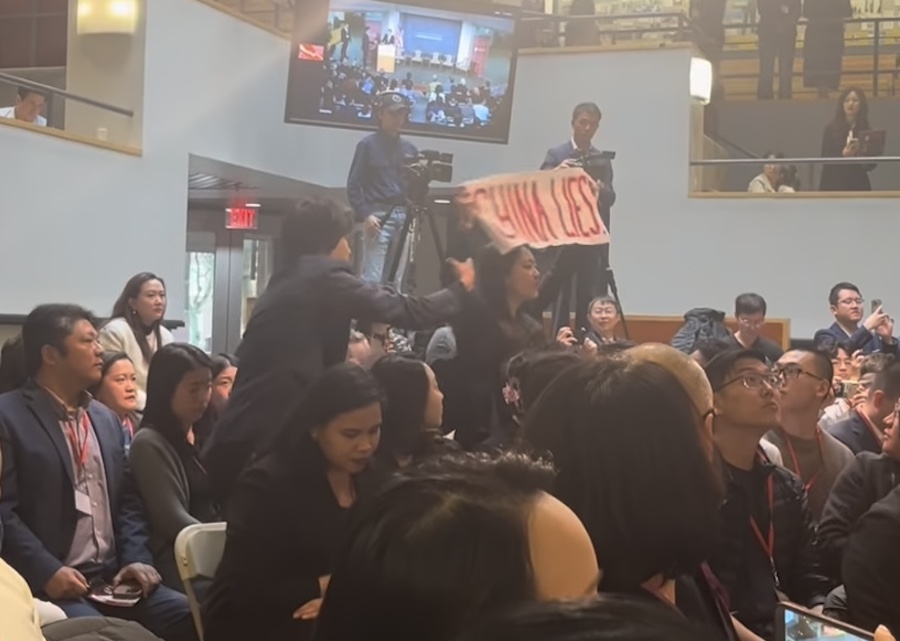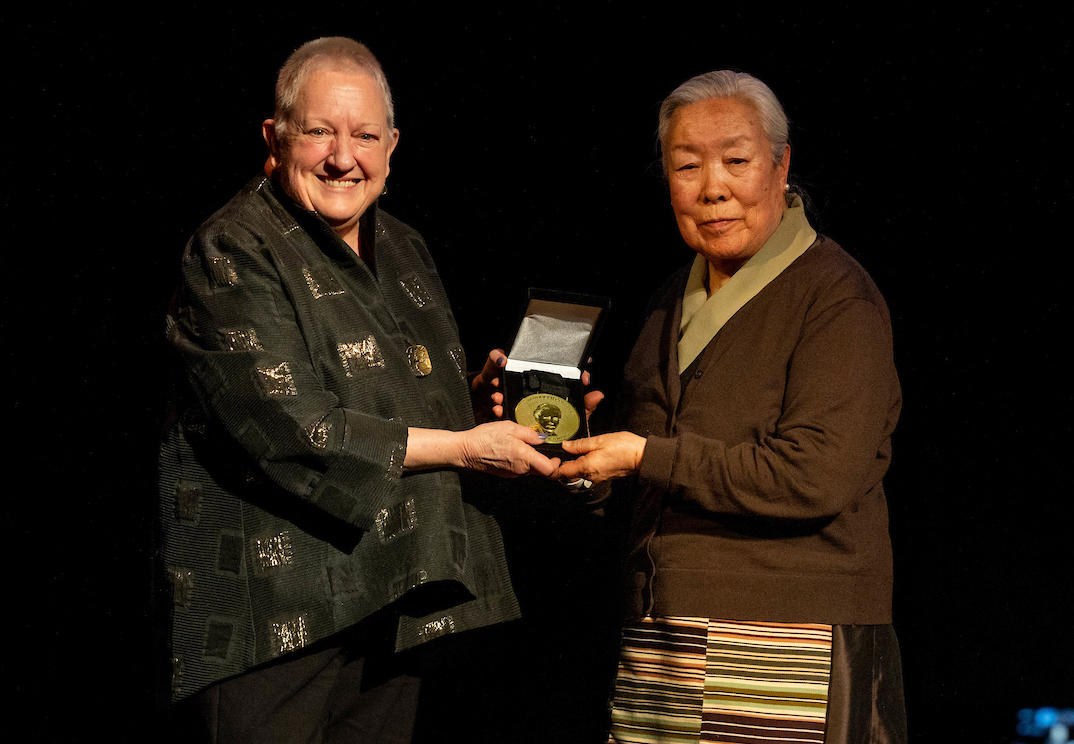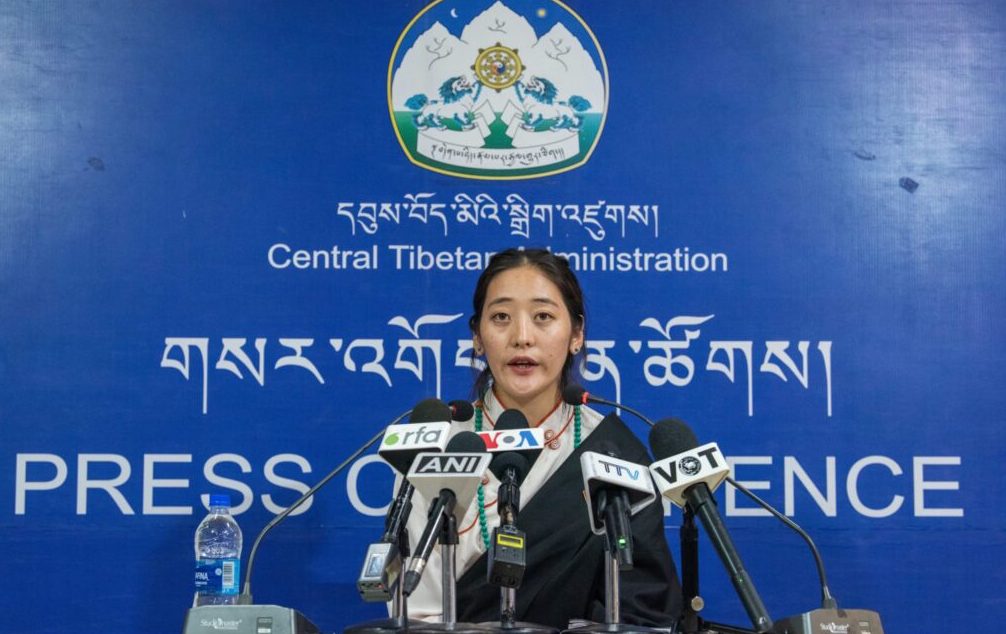By Wasfia Nazreen
 Dharamsala – Tibetan Independence activist and writer Tenzin Tsundue while speaking to Phayul.com on a wide variety of issues like youth activism, demand for independence, his writing penchant and his recent US trip, says he is “like little gods with multiple hands”. He comes around with his third book “Semshook: essays on Tibetan freedom struggle”. The vocal and arguably the most visible face of Tibetan youth activism – protesting in the face of China – surprises us with such contemplative and compassionate writing that appeals not only to China for understanding, but melts the hearts of his own Tibetan critics. Here is the long-awaited interview as it unfolded exclusively for our Phayul readers within several meetings amidst a dreadfully active schedule of this young man.
Dharamsala – Tibetan Independence activist and writer Tenzin Tsundue while speaking to Phayul.com on a wide variety of issues like youth activism, demand for independence, his writing penchant and his recent US trip, says he is “like little gods with multiple hands”. He comes around with his third book “Semshook: essays on Tibetan freedom struggle”. The vocal and arguably the most visible face of Tibetan youth activism – protesting in the face of China – surprises us with such contemplative and compassionate writing that appeals not only to China for understanding, but melts the hearts of his own Tibetan critics. Here is the long-awaited interview as it unfolded exclusively for our Phayul readers within several meetings amidst a dreadfully active schedule of this young man.
Phayul: Tell us your feelings about Semshook. What are the key aspirations that shaped your focus of writing dating from Kora to Semshook?
Tenzin Tsundue (TT): In my third book “Semshook” I have tried to deal with day-to-day issues like youth activism, personal dilemmas in the struggle as well as larger issues like the direction of the Tibetan struggle, facing the China challenge and the dream of creating a new and independent Tibet. As an activist, there are always few things that I wanted to share with others as my opinions and also to seek others responses. The writing of these essays came after a chitchat with Pema Thinley La, the editor of Tibetan Review, who suggested that I do a monthly column for the magazine.
Phayul: Semshook is a collective of sixteen articles that seems to have been generated in different places over a period of a year. How does an activist like you coordinate a feat of being scattered with countless diverse responsibilities and still manage to manifest such inspiring writing compilation?
TT: As far as I am concerned, I have declared my personal war against China’s occupation of Tibet, and I will do whatever is possible to regain freedom for Tibet. I wear this red band around my head, the mark of my pledge that until we could make our country free and Independent I will wear this and work for Tibet everyday. I am a small-time activist, I cannot achieve anything substantial on my own, and therefore I believe we have to create a strong Tibetan public movement. My writings are in the first place my effort for communication within the comrades, especially the youth. Being an activist and writer, also playing many other roles, sometimes I feel we are like little gods with multiple hands.
Phayul: In your third book you talk about “Internal Swaraj” and the work needed within the Tibetan community before facing China. In regards to the youth who are born in exile- how do you ideally see them achieving the genuine Swaraj you talk about?
TT: Swaraj is a continuous process of liberating the self through learning and unlearning. This education can empower us to free ourselves from social and political dependencies and lethargy. Only an independent entity can truly seek cooperation and think of communities beyond borders. Swaraj can be pursued at an individual level as well as by a community with larger participation. Gandhi’s idea of Swaraj is now more than relevant today as the world is coming to an edge pushed by the rampant consumerist culture. Practically, step by step even if we could shake-off our four decades of jindag culture (foreign sponsorship) and start to do things on our own no matter how small, we would have made our first step towards Independence.
The biggest poverty in our community is not of money, but ideas. People have stopped thinking. It’s very rare to see genuine and original ideas in the Tibetan exile community. It’s scary to realize the paucity of thinking power. Big talkers with no genuine effort have generated so much cynicism in our community. On the four wheels of optimism, a journey run by hope engine can promise us our destination.
Phayul: In Semshook we get the feeling that you are fully confident when you mention about ‘Sino-Indian friendship’ to be just on the surface-level. Yet when you were house-arrested last year during Hu Jintao’s visit, we saw another Tsundue who seemed pretty frustrated with the ‘democratic’ stances that the Indian Government takes. Would you like to say more on the reality of the totality of this scene?
TT: Let us remember that the Indian government stopped one man, but allowed three thousand Tibetans from different places to gather in New Delhi to protest Hu’s visit. Similar protest was allowed in Mumbai too where Lhakpa Tsering’s self-immolation bid captured international media attention. Almost 40-50 such protest rallies and vigils were organized by Tibetans and Indian Tibet supporters all over India. Of course, I still protested the restrictions put on me. If needed, I would have broken the detention order.
 Phayul: You went on your first three-week long State-hopping trip to the US. Tell us about the destinations and the chaotic ness of your activities in your first trip to America.
Phayul: You went on your first three-week long State-hopping trip to the US. Tell us about the destinations and the chaotic ness of your activities in your first trip to America.
TT: Well, it was an invitation from Regional Tibetan Youth Congress New York/New Jersey, and also by RTYC Portland/Vancouver, RTYC Minnesota and Students for Free Tibet to take part in this years March 10 Anniversary in New York. During the trip different local Tibetan Communities and RTYCs asked me to come to their places to talk on the Tibetan struggle, the first one was to Washington DC by the Capital Area Tibetan Association. I spoke at a Tibetan gathering in Virginia organized by CATA. On return to NYC, SFT organized a discussion with their volunteers on “Youth and Activism” which I addressed with SFT Director Lhadon La. The rest of the 20 days were spent traveling to meet Tibetans in Minnesota, San Francisco, Chicago, Portland, Vancouver, and Nashville. In my 24-day trip to the US, I was able to visit seven different places where I had 22 talks and discussion sessions, and met Tibetans from all over America, especially a lot of fellow youngsters. Our common aspiration of freedom for Tibet was our deeply felt binding force.
Phayul: The New York Symposium was one of the highlights of your travel to the West, where you shared the podium with Gyalo Dhondup and TYC President. What are your reflections on it?
TT: Gyalo Dhondup la is a historical personality. I had listened to Gyalo Dhondup earlier when he gave a talk in Dharamsala organized by the Amdo Association and also on Radio Free Asia. The symposium was my first opportunity to meet him personally, so I went up to him, extending my hands for a handshake I introduced myself. He slightly nodded in a cold recognition. He seemed quite oblivious about Tibetan youth activism. Gyalo Dhondup disappointed me with his symposium lecture; even after sixty years of betrayal by China and being beaten at the game, still he advocated talking to China, to trust China. And just last year he made a hue and cry about China’s inconsistency in the dialogue process. I think he still lives in Deng Xioping era, while Hu Jintao and Wen Jiabo have moved on, trying to create their own track records in the history of RRC.
Phayul: And just after that, you attended the Congressional hearing on Tibet in D.C. where Mr. Lodi Gyari and Richard Gere were.
TT: I Saw Gyari Rinpoche in some action. I loved Tom Lantos for his genuine concern for Tibet that came out so vividly in the form of his effort to speak up for Tibet. Richard Gere really impressed me with the depth of knowledge on the Tibet issue, more so with the sensitivity with which he spoke in support of Tibet. At the end of the session, Gyari Rinpoche tried to introduce me to Richard Gere but the latter couldn’t place me anywhere and there was no time.
Phayul: In Nashville, you had the first ‘Rangzen’ meeting with Jamyang Norbu?
TT: With Jamyang Norbu and two other Tibetan Rangzen activists, we had the first Rangzen meet in March this year. It’s too early to say much now. Yes we are working on something substantial and we will talk about it when we are ready. I have so much of respect for Gyen Jamyang Norbu La. He would be coming to India for sometime in June and July this year. We are hoping to do youth engagement meetings seeking his guidance from his enormous experience in writing, activism, advocacy, and education.
Phayul: Since 1949, till today, even with heightened global awareness on the Tibetan urgency, Independence has not tasted any form of fruitful outcomes or even hope of attaining it. What do you feel is the biggest challenge for your personal Rangzen stand that you still so stubbornly stand for?
TT: Global awareness and Independence movement are not related as ‘means to the end’. Of course, our supporters and global awareness can help enhance our movement but the Independence movement should be led and carried out by our own people. And for a long time our leadership has been meaning to find a negotiated solution with the Chinese and has already compromised on Independence as the goal of the struggle. The biggest challenge now is for the community to see the reality that China is NOT interested in talking and realize that Independence is the only way out with which we can lead an active public movement.
Having faith in His Holiness the Dalai Lama doesn’t mean we put all responsibility of the struggle on one man. The parliament must look at the situation objectively as it is by parliamentary resolution with which the “Middle Way Approach” was adopted the policy of the Exile-Government. We need to review the efficacy of the policy. We just cannot wait like this hoping that one day China would change its mind. Freedom is fought for and won, never given out of pity.
 Phayul: You have often commented in numerous violent ways of taking measure, for example as you say in Semshook that your initial reaction following the Nangpala incident was to set fire to the Chinese Embassy in Delhi, and then you resolved to coming to a peaceful strategic approach. Do you ever feel there is danger in controlling that ‘human’ in you, which can take over in extreme situation facing the enemy, even within your non-violent approach?
Phayul: You have often commented in numerous violent ways of taking measure, for example as you say in Semshook that your initial reaction following the Nangpala incident was to set fire to the Chinese Embassy in Delhi, and then you resolved to coming to a peaceful strategic approach. Do you ever feel there is danger in controlling that ‘human’ in you, which can take over in extreme situation facing the enemy, even within your non-violent approach?
TT: It is also human to seek a peaceful solution to our problems. The fire that ravages the house and burns it down to ashes if channelised can also be the little flickering flame of the lamp. My commitment to non-violence is mainly to see a free Tibet where we don’t have to end up like Israelis and Palestinians; so that in future we can live in our own country with China as a neighbour and not enemy. But not all Tibetans think like this. If China couldn’t understand this, and if China doesn’t withdraw from its occupation of Tibet within the lifetime of His Holiness, some Tibetans may start to use other methods in the struggle.
Phayul: Following the recent Olympics protest feat at Mount-Everest, Beijing has publicly announced that ‘foreigners’ will be punished the same as any one else for activities geared against Chinese sovereignty or Motherland’s unity. With the spotlight on Olympic, in your mind what is the most influencing effort Tibet-supporters can make right now? What is your message to the Exiled community in regards to raising Swaraj for the coming Olympic?
TT: China will make all efforts possible to show their country’s success with internal Unity and external prosperity with international contacts. China will parade in front of the whole world Tibetan monks, nomads, women and children and say that Tibetans are happy in Tibet as part of China. And this propaganda we have to fight no matter what it takes.
I want to tell China we will come down from the sky, emerge out of the earth into your Olympic stadiums. We will be there; we will see who stops whom. The smart protest by our friend Tendor and his friends at the Mt Everest the other day is only to give you a taste of what we will do. Tibetans and supporters in free country can use their freedom and speak up for themselves and for the Tibetans who are living under the brutal regime run by PRC. China cannot wish away their Tibet problem, with young Tibetans growing up everywhere in the world, the issue of Tibet is only becoming bigger. It’s not about Dalai Lama, it’s about us; our lives, our future, and we will not give up, no matter what.
Phayul: You have quite publicly criticized the policy of ‘the middle way’ approach. It is easy to perceive it as a direct attack on HHDL. Any comments?
TT: In the early years of exile, the community was defensive and claustrophobic; writers and intellectuals like Dawa Norbu, Jamyang Norbu and Lhasang Tsering had to suffer public admonishment due to their expression of difference of opinions from the main stream. But now the community enjoys much more ideological variance and acceptability. Even though I have criticized the policy of Middle Way Path as a “wishful thinking” and impracticable one to deal with China, it is however seen as a constructive criticism in a democratic sense and nothing against His Holiness.
Phayul: In New York Times, Rollingstone and now in Japan Times, you have been portrayed as a violent leader to the struggle. How do you feel about it? Does it bother you?
TT: Firstly I am not a leader; neither do I have any office or position to boast of. I am only a small-time activist living out of my writing, selling my book for fifty rupees. Let me inform these media that there is NO organized violent movement, at least not in my knowledge. Finding difference with His Holiness the Dalai Lama in political stand on Tibet and vocally expressing it doesn’t make me a “violent leader”, we are just being democratic. Media often resorts to cheap tricks to sensationalize issues to better sell their news products. I am deeply committed to Non-violence as a basic principle of life, and will adhere to it as long as I see hope in the struggle. I pray we continue to find strength and support to our commitment from the international community.
Phayul: You are one of the most distinguished youth figures in the Tibetan exiled community and last year during the parliamentary elections, you withdrew you name although there was a huge public support. People accuse you for not taking responsibility in Tibetan Youth Congress. Your comments please?
TT: I am an activist, not a politician; I just cannot work in the parliament. Luckily, I was able to submit my nomination withdrawal letter on the last day. I am happy I escaped being thrown into the parliament. I would be lost in that maze of politics; it’s not my cup of tea.
I have high regards for TYC and I would be happy to work in TYC, in any capacity, if there is a good team to work with; sincere and hardworking people. But I am not eligible to work in TYC as I do not fulfill the criteria as per TYC rules.
Phayul: You are one of the very few writers who barely live off with the small earnings from published writings. How is that working for you at the present?
TT: I live frugally, a simple need-based life. As an activist with no specific “Job”, the writer’s little money feeds the activist. I started early, immediately after school; even as a college student in Madras I trained myself in activism. It’s been 14 difficult years now, and I am ready to go any length and in depth. Tibet is my meaning of life.
Phayul: Blessed gratitude for this rendezvous Tsundue La.









